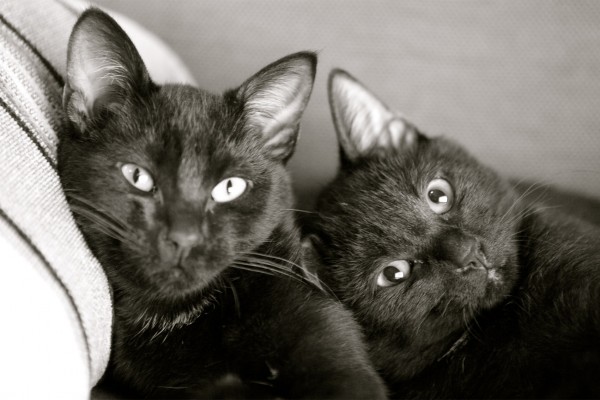
Above: Picture of Kalu and Killy courtesy of Sandymount Pet Hospital.
Ireland is known as a nation of animal lovers, and when we take pets into our home they quickly become integral members of our family. There is a lot of pain involved with losing a cherished pet, with many experiencing profound grief at having to say goodbye to our furry friends.
Sandymount Pet Hospital have recently come across a very sad case where two feline patients were accidentally poisoned, and they wish to make people aware of the dangers that lurk in some everyday items that pet owners may be unaware of.
Veterinary Surgeon Miriam McEvoy spoke to NewsFour. “When we think of poisons we might think of obvious products with skull and crossbones living on a high shelf. However, when it comes to pets, a poison could include something we would happily eat without a thought.” One such substance is chocolate, as McEvoy explains. “Pets are unable to break down the ingredient theobromine in chocolate so it accumulates in their bodies. The signs can range from vomiting and tremors to seizures and death.”
There are many other consumables that you may be surprised to know harbour toxins for pets. A shortlist includes grapes, avocado, macadamia nuts, onions and stock powder, garlic, yeast dough, salt coffee and anything sweetened with xylitol. This substance is extremely toxic to dogs and is found in chewing gum, toothpaste, mints, and multivitamins to name a few.
Many spring/summer flowers are extremely toxic to pets. The shortlist includes Crocus, Daffodil, Tulip, Hyacinth and Cyclamen. If you are a cat owner, however, the Lily tops this list in terms of seriousness and McEvoy warned, “These flowers are so toxic that they should not be in the same house as a cat.”
Stepping outside onto the lawn, be aware that many moss killers contain products that are toxic to cats. McEvoy added, “Even products which claim to be pet safe can cause problems. If they say keep out of reach of children then it’s best to assume pets should keep their distance also. Even ‘pet free’ gardens can have a visit from a neighbouring cat who will go home and lick his paws.
One last member of the garden shed that merits a mention due to its severity is anti-freeze. This contains ethylene glycol, which tastes sweet to pets; as little as a teaspoonful can be fatal to dog or cat as it causes kidney failure.”
Always give medication to the species it was prescribed for. For instance, flea products designed for dogs must never be applied to cats and human painkillers have detrimental effects in animals.
“It was our most tragic case of fatal poisoning – a young brother and sister cat – that prompted this article to raise awareness. Those are the cases which break our hearts. We have, of course, had those who have lived to tell the tale and add a dash of humour on which to end. One case involved a Great Dane that ate all of his owner’s duty-free cigarettes and while nicotine poisoning is very serious, prompt treatment ensured he made a full recovery.
We also had a little dog that ate deadly nightcap mushrooms; these are even fatal to humans. She endured a long recovery, involving some very specialist drugs but has earned herself the right, to the nickname ‘Iron stomach’ and she can now be seen running along Sandymount Strand. It’s a jungle out there!”
If you suspect your pet has encountered a poisonous substance, it is essential that you phone the vet as quickly as possible. Often with prompt attention your pet will be just fine.
Sandymount Pet Hospital
Ph 01 2695830
A comprehensive list of pet poisons can be found on www.petpoisonshelpline.com
By Maria Shields O’Kelly

